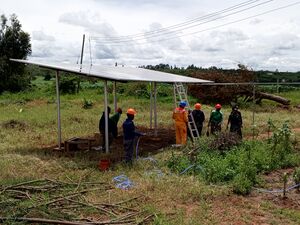Emmaberg Proves No Cold Shower School Using Solar Energy
Introduction
Evangelical Lutheran Church in Tanzania-Southern Diocese under the leadership of the Bishop Dr. Rev George Fihavango owns Emmaberg Girls High School located in the outskirts of the town of Makambako in Njombe Region, Tanzania. The school enables needy girls to access secondary school education to the advanced level.
This article presents the integrated solar project developed to intervene in challenges of unreliable water supply, unavailability of hot water for showers and unavailability of lights in the dormitories when the national grid electricity fails. The project was realized in the partnership of the Evangelical Lutheran Church in Tanzania-Southern Diocese and SchuPa Tansania Verein. The project was financed by SchuPa and the Bavarian State Chancellery of Germany.
The school had been experiencing an unreliable and costly water supply. The water was being pumped from a borehole using national grid electricity. The school experienced frequent, long and uninformed power outages. When there was a power cut, students had to collect water from the river, which is also used by cattle. The water caused skin and abdominal diseases. Urinary tract infection cases were common. The food preparation in the kitchen was being delayed due to the untimely delivery of water. When there was a grid outage in the evening, students had to stay in the dark in the dormitories.
The school is located in a cold region. During the winter, the temperature goes down to 4 Celsius Degree. Since it was expensive to heat shower water using electricity or firewood, most of the students assumed showers lasted up to a month.
Interventions
The partners developed a project, “Warm Water for the Female High School Students of Emmaberg Girls’ School, Tanzania”. The project results were as follows.
Project Results Project Outputs
- The new 4m high water tower was constructed.
- Water tank capacity increased from 10 m3 to 30 m3.
- Solar PV plant 7.2kW replaced the national grid at 100% for the water pump.
- Water efficient use and energy management devices (pump dry-run sensor and tank-overflow controls) installed in the water system.
- 2 solar water heaters for showers, 1,500 litres and 2,700 litres installed.
- 2 solar photovoltaic systems, 0.9 kWp and 1.8 kWp, for two dormitories' lighting installed.
- 10 teachers trained in solar systems maintenance.
- 200 students sensitized on renewable energy and best practices of using solar systems.
- 15 students trained for the Students’ Solar Service Team.
Project Outcomes
- Water supply is efficient, reliable, clean and uninterrupted.
- The school is not spending money on water pumping and electricity bills.
- Girls have access to hot water for showering.
- Girls have reliable and free electricity for lighting in the dormitories.
- The school has got solar maintenance team in place.
- Students are aware of the potential of renewable energy.
- The school has a solar service team, and
- The number of girls enrolment is increasing.
Project Impacts
- Girls’ academic performance increased.
- Girls live a healthy life.
- School enrolment increased to the maximum capacity.
- The school contributed to the climate change trend reversal by avoiding the 22,378 KgCO2eq/year through using water heaters, and 445,442 KgCO2eq/year, for pumping water using solar photovoltaics.
- The school is financially stable.
Girls witnessed a change in their quality of life as a result of the project. The following were the witnesses to the girls.
- Hygiene has increased as girls have the chance to take showers at a minimum of two times a day.
- Urinary Tract Infections and abdominal diseases have diminished as water is safe.
- Time for study has increased due to the avoidance of duties of boiling shower water and fetching water from the river.
Further, students are aware of the potential of renewable energy in ensuring sustainable development. Students are also aware that cutting bills of electricity for pumping water and lighting for dormitories to zero, will stabilize the school fees.
A project of this kind is the first one in size in Tanzania, supplying a minimum of 4,200 litres of hot water for showers for the academic institution, to be implemented in mainland Tanzania.
Institutions in the cold climate areas are encouraged to adopt the water solar pumping and heating technologies.





















